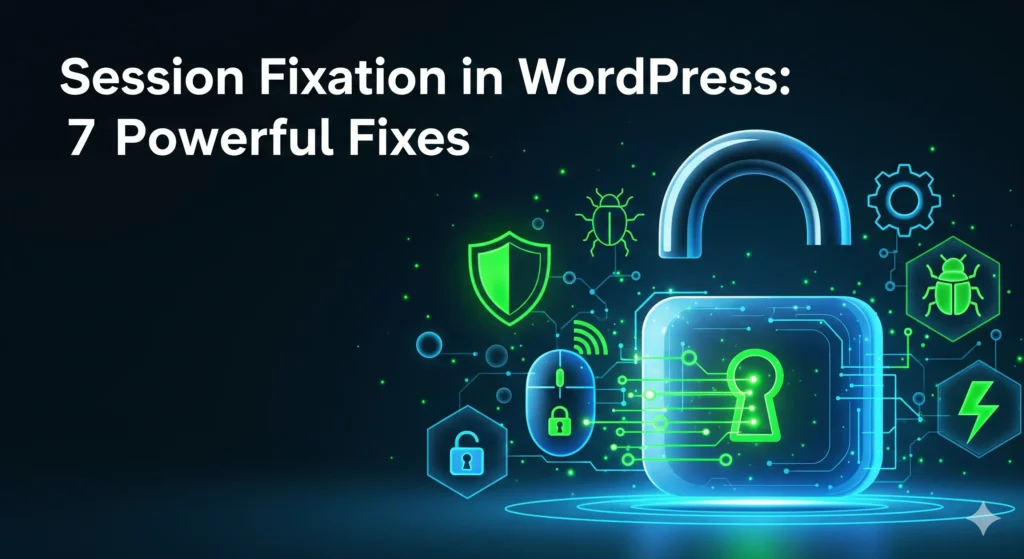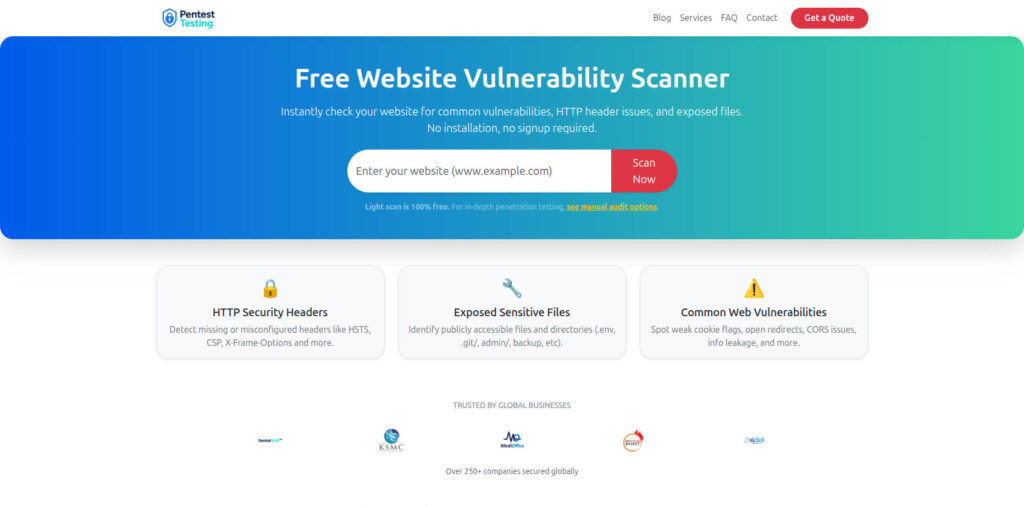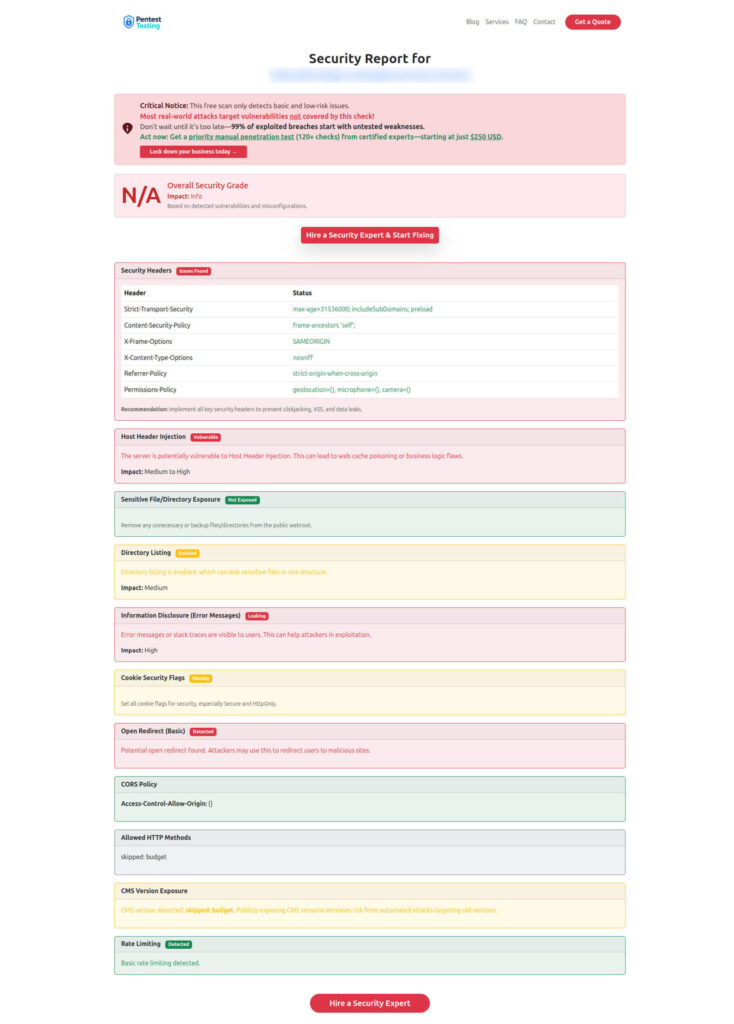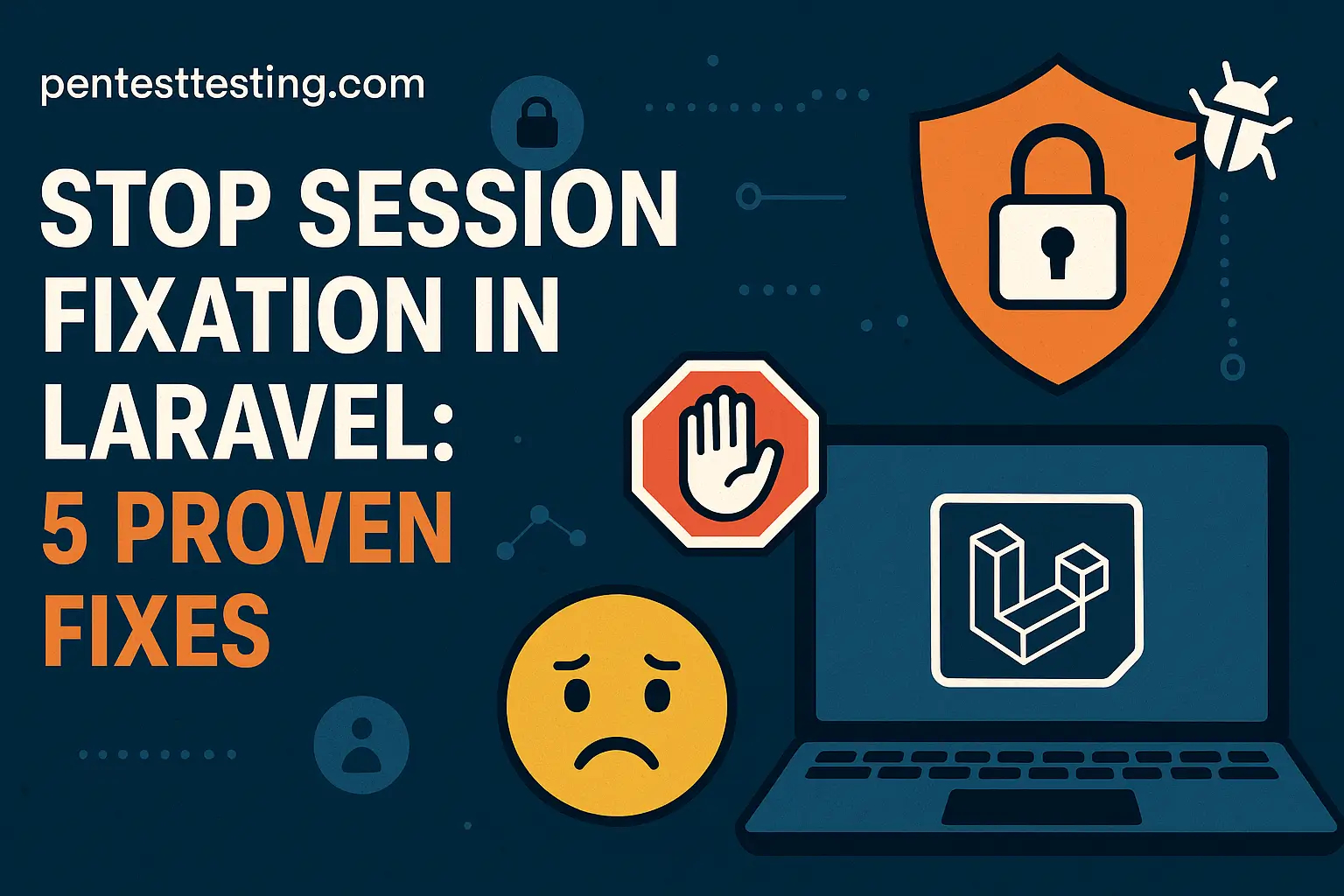Session Fixation in WordPress: 7 Powerful Fixes (with Code)
If an attacker can set or predict a victim’s session identifier before the victim logs in, they can hijack the authenticated session later. That’s session fixation. While core WordPress relies on secure auth cookies (not PHP’s native $_SESSION), Session Fixation in WordPress still occurs in real sites—often via plugins that start PHP sessions, weak cookie flags, non-rotating tokens, or misconfigured servers.

This practical guide shows how to eliminate Session Fixation in WordPress with seven proven fixes, production-ready snippets, and verification steps.
What is Session Fixation (and how it hits WordPress)?
In Session Fixation in WordPress, an attacker supplies (or forces) a session ID or cookie to the user—via a shared link, injected cookie, compromised subdomain, or a vulnerable plugin that calls session_start() without regenerating IDs. After the victim logs in, the attacker reuses that fixed ID to ride the session.
Common routes:
- Plugins or themes that call
session_start()but neversession_regenerate_id(true)after auth. - Missing
HttpOnly,Secure, andSameSiteflags on cookies. - Non-rotating session tokens after login or password change.
- Insecure HTTP where cookies leak via network sniffing.
Fast Wins Checklist (Do These First)
- Force HTTPS site-wide; redirect HTTP→HTTPS.
- Lock down cookies:
Secure,HttpOnly, and a strictSameSitepolicy. - Regenerate tokens after login and kill other sessions.
- Destroy all sessions on password reset and privilege changes.
- Eliminate PHP sessions (or at least regenerate IDs post-auth).
- Harden headers (no sniff, frame-ancestors, etc.).
- Scan regularly with automated checks (use our free tool).
Throughout this article, we’ll keep using the phrase Session Fixation in WordPress naturally so you can target it for SEO without stuffing.
Screenshot of our free Website Vulnerability Scanner page

1) Rotate WordPress Session Tokens on Login (and kill others)
WordPress maintains “session tokens” (not PHP sessions) per user. On login, create a fresh token and invalidate all others to prevent fixation.
Minimal plugin to keep only the current login session
Create wp-content/mu-plugins/secure-session-rotation.php:
<?php
/**
* Plugin Name: Secure Session Rotation
* Description: Prevents session fixation by invalidating other sessions at login; optional hardening on password reset.
* Author: Pentest Testing Corp
*/
// Keep only the *current* session on login
add_action('wp_login', function($user_login, $user) {
if (!function_exists('wp_get_session_token')) return;
$current_token = wp_get_session_token();
if (!$current_token || !($user instanceof WP_User)) return;
$manager = WP_Session_Tokens::get_instance($user->ID);
// Destroy all other sessions except the one just issued at login
$manager->destroy_others($current_token);
}, 10, 2);
// Destroy ALL sessions on password reset
add_action('password_reset', function($user) {
if (!($user instanceof WP_User)) return;
$manager = WP_Session_Tokens::get_instance($user->ID);
$manager->destroy_all();
});Why it helps: If an attacker fixed a token earlier (via a rogue cookie), invalidating others ensures the attacker’s token no longer works after the victim logs in—mitigating Session Fixation in WordPress.
2) Force HTTPS and Strict Cookie Flags (Apache + Nginx)
Apache (.htaccess)
# Redirect all HTTP to HTTPS
RewriteEngine On
RewriteCond %{HTTPS} !=on
RewriteRule ^(.*)$ https://%{HTTP_HOST}%{REQUEST_URI} [R=301,L]
# Harden cookies set by WordPress/plugins
# Requires Apache 2.4+ (mod_headers)
# Adds Secure, HttpOnly, and SameSite=Lax to *all* Set-Cookie responses.
Header always edit Set-Cookie "(?i)^(.*)$" "$1; HttpOnly; Secure; SameSite=Lax"Nginx (server block)
# Redirect HTTP to HTTPS
server {
listen 80;
server_name example.com www.example.com;
return 301 https://$host$request_uri;
}
# Harden cookies over HTTPS
server {
listen 443 ssl http2;
server_name example.com www.example.com;
# ... ssl_certificate configs here ...
# Append flags to all Set-Cookie responses
add_header Set-Cookie $sent_http_set_cookie" always";
proxy_cookie_path / "/; HttpOnly; Secure; SameSite=Lax";
}Note: If you rely on cross-site flows (e.g., some payment gateways or SSO), you might need
SameSite=None; Securefor specific cookies. Test flows after changes. Done right, this step dramatically reduces Session Fixation in WordPress paths.
3) Prevent Plugins from Starting PHP Sessions (or Regenerate Properly)
Core WordPress doesn’t need PHP sessions. Many fixation cases come from plugins calling session_start() and never regenerating IDs.
Block accidental session_start() early
Create wp-content/mu-plugins/block-php-sessions.php:
<?php
/**
* Plugin Name: Block PHP Sessions
* Description: Detects and prevents unsafe PHP session usage to reduce session fixation risk.
*/
// If a plugin tries to start sessions on init, kill it and log.
add_action('init', function() {
if (function_exists('session_status') && session_status() === PHP_SESSION_ACTIVE) {
// Session already active — not ideal. Log it.
error_log('PHP session already active — potential fixation risk. Investigate plugins.');
}
// Disable auto start via ini
if (ini_get('session.auto_start')) {
ini_set('session.auto_start', '0');
}
}, 0);If you must use PHP sessions in custom code
Regenerate the session ID right after successful authentication:
<?php
// After verifying user credentials:
if (isset($_POST['username'], $_POST['password']) && custom_auth_ok($_POST['username'], $_POST['password'])) {
if (session_status() !== PHP_SESSION_ACTIVE) {
session_start();
}
// Critical for preventing fixation:
session_regenerate_id(true); // invalidate old ID and create a new one
$_SESSION['uid'] = get_current_user_id();
// Redirect to dashboard...
}This is core to stopping Session Fixation in WordPress when custom plugins add sessions.
4) Enforce Single-Session or Session Rotation by Policy
Allow only one active session per user
<?php
/**
* One-Session-Only Policy
*/
add_filter('wp_authenticate_user', function($user) {
if (is_wp_error($user)) return $user;
$manager = WP_Session_Tokens::get_instance($user->ID);
// Destroy all existing sessions before issuing a new one
$manager->destroy_all();
return $user;
}, 30);This ensures a fresh token every login and removes any fixed/lingering tokens.
5) Add Defensive Security Headers
These don’t directly regenerate tokens, but they reduce exploitability and click-through attacks that sometimes accompany Session Fixation in WordPress.
Apache
Header always set X-Frame-Options "SAMEORIGIN"
Header always set X-Content-Type-Options "nosniff"
Header always set Referrer-Policy "strict-origin-when-cross-origin"
Header always set Permissions-Policy "geolocation=(), camera=(), microphone=()"Nginx
add_header X-Frame-Options "SAMEORIGIN" always;
add_header X-Content-Type-Options "nosniff" always;
add_header Referrer-Policy "strict-origin-when-cross-origin" always;
add_header Permissions-Policy "geolocation=(), camera=(), microphone=()" always;6) Verify: Reproduce Session Fixation and Confirm the Fix
Unsafe (for demonstration in a staging environment only):
<?php
// DO NOT USE IN PRODUCTION — this demonstrates a vulnerable pattern.
if (isset($_GET['sid'])) {
session_id($_GET['sid']); // attacker-controlled session ID
}
session_start();
// ... later, after login, no regeneration happens ...Attacker flow (local test):
# Attacker sets a known session id (just demo)
SID="attackersession123"
# Victim visits a link where the vulnerable code fixes SID
# Later victim logs in. Without regeneration, same SID remains "authenticated".
# Attacker reuses SID to access authenticated area:
curl -H "Cookie: PHPSESSID=${SID}" https://staging.example.com/wp-admin/profile.phpAfter applying fixes above, the curl should be rejected (401/redirect), proving Session Fixation in WordPress defenses are working.
7) Automate Scanning & Continuous Hardening
Run our free Website Security Scanner to catch cookie flag issues, header gaps, and common WordPress risks:
Sample assessment report generated by our tool to check Website Vulnerability

You can also cross-read our practical guides:
- Sensitive data handling in Node.js (external): cybersrely.com/sensitive-data-exposure-in-node-js/
- Clickjacking defenses for WordPress: pentesttesting.com/clickjacking-prevention-in-wordpress/
- Broken Authentication in WordPress: pentesttesting.com/broken-authentication-in-wordpress/
- Prevent MITM Attack in WordPress: pentesttesting.com/prevent-mitm-attack-in-wordpress/
- SQLi protection (OpenCart): pentesttesting.com/prevent-sql-injection-in-opencart/
These resources complement your defenses against Session Fixation in WordPress.
Extra Hardening Snippets
Force secure admin cookies only over HTTPS
<?php
add_filter('secure_auth_cookie', '__return_true');
add_filter('secure_logged_in_cookie', '__return_true');Make auth cookies short-lived for sensitive roles
<?php
add_filter('auth_cookie_expiration', function($seconds, $user_id, $remember) {
$user = get_user_by('id', $user_id);
if ($user && in_array('administrator', (array) $user->roles, true)) {
return 2 * HOUR_IN_SECONDS; // 2h for admins
}
return $seconds; // default for others
}, 10, 3);Add CSP to reduce injection vectors
Header always set Content-Security-Policy "default-src 'self'; img-src 'self' data: https:; script-src 'self' 'unsafe-inline' https:; style-src 'self' 'unsafe-inline' https:"Tune CSP for your theme/plugins and CDNs.
Managed Services & Specialized Help
Managed IT Services (for uptime & resilience)
Stronger security is easier with disciplined ops. Our Managed IT Services team standardizes HTTPS, enforces secure cookie policies, maintains headers, and continuously validates your environment—so Session Fixation in WordPress doesn’t creep back.
AI Application Cybersecurity (protect ML-powered features)
If your WordPress integrates AI/ML or third-party APIs, our AI Application Cybersecurity service threat-models tokens, webhooks, and callback flows—key places where fixation and token replay risks hide.
Offer Cybersecurity to Your Clients (white-label)
Agencies and MSPs can resell our audits and hardening playbooks. Learn more: Offer Cybersecurity Service to Your Client. We’ll help you deliver fixes for Session Fixation in WordPress at scale.
Complete Walkthrough: From Risk to Remediation
- Baseline scan with our tool, capture cookie flags and headers.
- Force HTTPS + redirects; retest.
- Harden Set-Cookie flags (
Secure,HttpOnly,SameSite). - Install rotation plugin (section #1) and enforce single-session if policy allows.
- Block/replace PHP sessions or regenerate IDs in custom code.
- Shorten admin cookie TTL; adopt strong headers and CSP.
- Re-scan and regression test.
- Schedule monthly checks and before/after major plugin updates.
With these steps, Session Fixation in WordPress becomes a non-issue on your site.
Try It Free, Then Scale It
Run the free scan at free.pentesttesting.com, fix what it flags, then engage our team for a deeper hardening sprint. For broader topics beyond Session Fixation in WordPress, check our articles on Clickjacking Prevention, Broken Authentication, and SQL Injection in OpenCart. Also see our partner post on Sensitive Data Exposure in Node.js.
Copy-Paste Snippet Index
- Session rotation plugin:
secure-session-rotation.php - One-session policy filter:
wp_authenticate_userexample - Password reset session kill:
password_resethook - Cookie flags & HTTPS: Apache/Nginx examples
- Block PHP sessions:
block-php-sessions.php - Custom PHP sessions:
session_regenerate_id(true)pattern
Pro tip: Bookmark this checklist and re-run it after each major plugin/theme update. That’s how you keep Session Fixation in WordPress out—permanently.
🔐 Frequently Asked Questions (FAQs)
Find answers to commonly asked questions about Session Fixation in WordPress.

